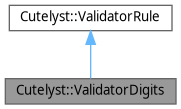 |
cutelyst 4.3.0
A C++ Web Framework built on top of Qt, using the simple approach of Catalyst (Perl) framework.
|
 |
cutelyst 4.3.0
A C++ Web Framework built on top of Qt, using the simple approach of Catalyst (Perl) framework.
|
Checks for digits only with optional length check. More...
#include <Cutelyst/Plugins/Utils/validatordigits.h>

Public Member Functions | |
| ValidatorDigits (const QString &field, const QVariant &length=-1, const ValidatorMessages &messages=ValidatorMessages(), const QString &defValKey=QString()) | |
| ~ValidatorDigits () override | |
 Public Member Functions inherited from Cutelyst::ValidatorRule Public Member Functions inherited from Cutelyst::ValidatorRule | |
| ValidatorRule (const QString &field, const ValidatorMessages &messages={}, const QString &defValKey={}, QByteArrayView validatorName=nullptr) | |
| virtual | ~ValidatorRule () |
| Deconstructs the ValidatorRule. | |
Static Public Member Functions | |
| static bool | validate (const QString &value, qsizetype length=-1) |
Returns true if value only contains digits. | |
Protected Member Functions | |
| QString | genericValidationError (Context *c, const QVariant &errorData=QVariant()) const override |
| ValidatorReturnType | validate (Context *c, const ParamsMultiMap ¶ms) const override |
 Protected Member Functions inherited from Cutelyst::ValidatorRule Protected Member Functions inherited from Cutelyst::ValidatorRule | |
| ValidatorRule (ValidatorRulePrivate &dd) | |
| QString | debugString (Context *c) const |
| void | defaultValue (Context *c, ValidatorReturnType *result) const |
| QString | field () const noexcept |
| virtual QString | genericParsingError (Context *c, const QVariant &errorData={}) const |
| virtual QString | genericValidationDataError (Context *c, const QVariant &errorData={}) const |
| QString | label (Context *c) const |
| QString | parsingError (Context *c, const QVariant &errorData={}) const |
| bool | trimBefore () const noexcept |
| QString | validationDataError (Context *c, const QVariant &errorData={}) const |
| QString | validationError (Context *c, const QVariant &errorData={}) const |
| QString | value (const ParamsMultiMap ¶ms) const |
The field under validation must only contain digits with an optional exact length. If length is set to a value lower or equal to 0, the length check will not be performed. The input digits will not be interpreted as numeric values but as a string. So the length is not meant to test for an exact numeric value but for the string length. The length can be either specified as fixed value or as a QString naming a stash key that contains the length value.
Definition at line 41 of file validatordigits.h.
| ValidatorDigits::ValidatorDigits | ( | const QString & | field, |
| const QVariant & | length = -1, |
||
| const ValidatorMessages & | messages = ValidatorMessages(), |
||
| const QString & | defValKey = QString() |
||
| ) |
Constructs a new ValidatorDigits with the given parameters.
| field | Name of the input field to validate. |
| length | Exact length of the digits, defaults to -1. A value lower 1 disables the length check. Should be either an int to directly specify the length or the name of a Stash key containing the length constraint. |
| messages | Custom error messages if validation fails. |
| defValKey | Stash key containing a default value if input field is empty. This value will NOT be validated. |
Definition at line 10 of file validatordigits.cpp.
|
overridedefault |
Destroys the ValidatorDigits object.
|
overrideprotectedvirtual |
Returns a generic error if validation failed.
Reimplemented from Cutelyst::ValidatorRule.
Definition at line 75 of file validatordigits.cpp.
References QString::arg(), QString::isEmpty(), Cutelyst::ValidatorRule::label(), Cutelyst::Context::qtTrId(), and QVariant::toInt().
|
overrideprotectedvirtual |
Performs the validation on the input params and returns the result.
If validation succeeded, ValidatorReturnType::value will contain the input parameter value as QString.
Implements Cutelyst::ValidatorRule.
Definition at line 20 of file validatordigits.cpp.
References Cutelyst::ValidatorRule::debugString(), Cutelyst::ValidatorRule::defaultValue(), Cutelyst::ValidatorReturnType::errorMessage, QString::isEmpty(), QString::length(), QVariant::setValue(), validate(), Cutelyst::ValidatorRule::validationDataError(), Cutelyst::ValidatorRule::validationError(), Cutelyst::ValidatorReturnType::value, and Cutelyst::ValidatorRule::value().